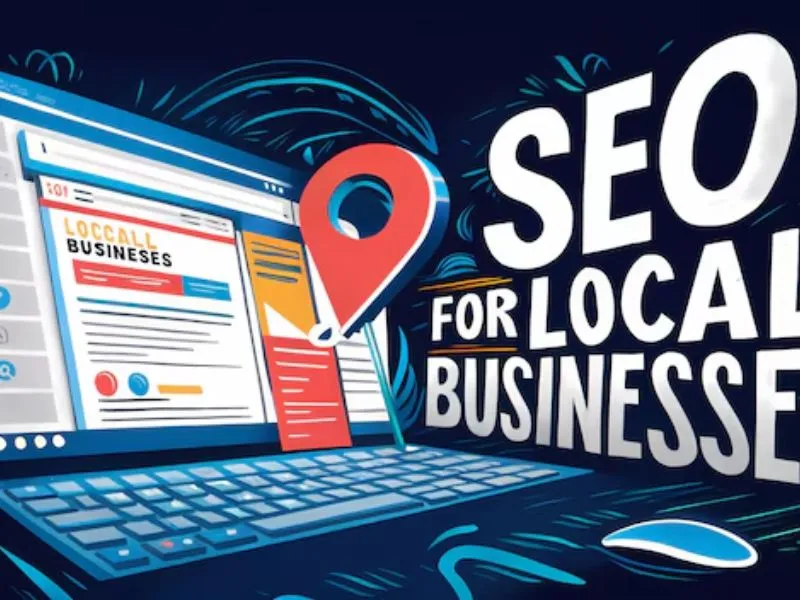What is local SEO and why does your business need it?
What is local SEO and why does your business need it? If you run a local business, whether it’s a coffee shop, a law firm, a bakery, or a plumbing service, you need to be visible to potential customers in your area. But how do you ensure that when people search for businesses like yours, they find you instead of your competitors? This is where Local SEO (Search Engine Optimization) comes in.
Local SEO is the practice of optimizing your online presence to attract more business from local searches on search engines like Google, Bing, and Yahoo. With more and more people relying on the internet to find businesses, Local SEO has become a critical marketing strategy for small and medium-sized businesses.
In this blog, we’ll explore what Local SEO is, how it works, and why it’s essential for your business. By the end of this guide, you’ll have a clear understanding of how you can leverage Local SEO to attract more customers and grow your business.
What is local SEO and why does your business need it?
Understanding Local SEO
How Local SEO Differs from Traditional SEO
Traditional SEO focuses on improving a website’s visibility on a global or national level, while Local SEO targets location-specific searches. For example:
- Traditional SEO: “Best smartphones in 2024”
- Local SEO: “Best smartphone store near me”
Local SEO helps businesses show up in search results when potential customers are looking for products or services in their area.
What is local SEO and why does your business need it?
Key Differences Between Traditional SEO and Local SEO
| Feature | Traditional SEO | Local SEO |
|---|---|---|
| Target Audience | Global/National | Local (City or Region) |
| Keyword Focus | General Keywords | Location-Specific Keywords |
| Google Algorithm | Organic Ranking Factors | Local Ranking Factors |
| Business Type | Online Businesses, E-commerce | Brick-and-Mortar Stores, Service-Based Businesses |
| Search Results | Web Pages and Blog Articles | Google Maps, Google My Business, Local Pack |
Local SEO is designed to increase visibility for businesses that rely on local customers, ensuring they appear in searches made within their specific geographic area.
What is local SEO and why does your business need it?
How Local SEO Works
What is local SEO and why does your business need it?
The Role of Search Engines in Local SEO
Search engines like Google use a combination of signals to determine which businesses to display for local searches. These include:
- Proximity – The distance between your business and the searcher’s location.
- Relevance – How well your business matches the search query.
- Prominence – How well-known and trusted your business is.
What is local SEO and why does your business need it?
How Google Determines Local Rankings
Google uses three main factors to rank local businesses:
- Google My Business Signals (Business name, category, and location)
- Review Signals (Customer reviews and ratings)
- On-Page Signals (Keywords, metadata, and website optimization)
By optimizing these factors, businesses can improve their visibility in Google’s Local Pack and organic search results.
What is local SEO and why does your business need it?
Key Elements of a Successful Local SEO Strategy
Local SEO is an essential strategy for businesses looking to increase visibility in their local area, attract more customers, and grow their revenue. Unlike traditional SEO, which focuses on ranking in global or national search results, Local SEO targets location-based searches, helping businesses appear in relevant local searches on Google and other search engines.
To ensure your business ranks well in local searches, you need to focus on several key elements. In this article, we will explore the most important components of a successful Local SEO strategy, including Google My Business optimization, local keyword optimization, customer reviews and ratings, local link building, and tracking SEO success.
What is local SEO and why does your business need it?
1. Google My Business Optimization
Claim and Verify Your Google My Business Listing
Google My Business (GMB) is a crucial tool for enhancing Local SEO. It allows businesses to manage their online presence, appear in local searches, and show up on Google Maps.
To claim and verify your GMB listing:
- Visit Google My Business and sign in.
- Search for your business to check if it already exists. If not, create a new listing.
- Enter your business details accurately.
- Verify your listing via postcard, phone, or email.
Provide Accurate Business Information
Your business name, address, phone number, and website (NAPW) must be consistent across all online platforms. Inconsistent information can confuse customers and negatively impact search rankings.
What is local SEO and why does your business need it?
Add High-Quality Photos and Videos
Businesses with high-quality images and videos receive 42% more requests for directions and 35% more clicks on their website links than those without.
- Upload photos of your storefront, interior, products, and team to build trust.
- Add videos showcasing your services or behind-the-scenes moments.
- Update your images regularly to keep your profile fresh and engaging.
Post Updates and Engage with Customers
Google My Business allows you to post updates, promotions, and events, keeping your audience engaged. Regular updates improve visibility and attract new customers.
What is local SEO and why does your business need it?
2. Local Keyword Optimization
Use Location-Specific Keywords
To improve your Local SEO ranking, you need to target local keywords that potential customers are searching for.
For example, instead of using:
❌ “Best coffee shop”
Use:
✅ “Best coffee shop in New York City”
Examples of local keyword types:
- “Affordable plumber in Chicago”
- “Top-rated dental clinic near me”
- “Best sushi restaurant in San Francisco”
Include Keywords in Meta Titles, Descriptions, and Website Content
Your meta title, meta description, and website content should include local keywords to signal relevance to search engines.
Example of an SEO-optimized meta title:
“Best Coffee Shop in New York | Freshly Brewed Coffee & Pastries”
Example of an SEO-optimized meta description:
☕ “Looking for the best coffee in New York? Visit [Business Name] for freshly brewed coffee, delicious pastries, and a cozy atmosphere. Find us near [Landmark]!”
What is local SEO and why does your business need it?
Optimize for Voice Search
With more people using voice search on mobile devices and smart speakers, optimizing for voice search is crucial.
Instead of just targeting:
❌ “Plumber in Los Angeles”
Target conversational phrases like:
✅ “Who is the best plumber near me?”
✅ “Where can I find a reliable plumber in Los Angeles?”
What is local SEO and why does your business need it?
3. Customer Reviews and Ratings
Motivate customers to share their reviews on Google and Yelp.
Reviews play a major role in local rankings. Google rewards businesses that have a high number of positive reviews with better search rankings.
Ways to encourage customers to leave reviews:
✅ Ask happy customers to leave a review after a purchase or service.
✅ Send a follow-up email or SMS with a direct link to your review page.
✅ Offer a small incentive (e.g., a discount or freebie) for leaving feedback.
What is local SEO and why does your business need it?
Respond to Both Positive and Negative Reviews
Engaging with customers by responding to all reviews (both good and bad) shows that you care about customer feedback.
How to respond to positive reviews:
✅ Thank the customer.
✅ Personalize the response.
✅ Invite them back.
✔ Example: “Thank you, Sarah! We’re so happy you loved our coffee! Hope to see you again soon!”
How to respond to negative reviews:
✅ Apologize and take responsibility.
✅ Offer to resolve the issue.
✅ Keep it professional.
✔ Example: “We’re sorry to hear about your experience, John. Please reach out to [contact info] so we can make things right.”
What is local SEO and why does your business need it?
4. Local Link Building
Link building is a crucial ranking factor in both traditional and Local SEO. Getting high-quality local backlinks increases your business’s authority and search ranking.
Get Backlinks from Local Businesses, Newspapers, and Directories
Ways to earn local backlinks:
✅ Partner with local businesses and exchange links.
✅ Get featured in local newspapers and magazines.
✅ List your business on local directories like Yelp, Yellow Pages, and TripAdvisor.
Participate in Community Events and Sponsorships
Supporting local events, charities, and sponsorships can help you gain visibility and backlinks. When event organizers mention your business on their website, it boosts your SEO and credibility.
What is local SEO and why does your business need it?
Tracking and Measuring Local SEO Success
Tracking your Local SEO performance ensures you’re making the right improvements. Use these tools to monitor progress:
Google Analytics – Measure Website Traffic from Local Searches
Google Analytics helps track:
- How much organic traffic your website is getting.
- Which local keywords are bringing visitors.
- Visitor behavior and interactions on your website.
Google My Business Insights – Track Views, Clicks, and Customer Actions
Google My Business Insights provides data on:
- How many people viewed your business profile.
- How many users requested directions to your location.
- How many customers called your business directly from Google.
Rank Tracking Tools – Check Local Keyword Rankings
Use tools like:
✅ SEMrush – To track local keyword rankings.
✅ Moz Local – To check NAP consistency.
✅ Ahrefs – To monitor backlinks and domain authority.
What is local SEO and why does your business need it?
Why Your Business Needs Local SEO
1. Increased Visibility in Local Searches
A well-optimized Local SEO strategy helps your business appear in Google’s Local Pack and Google Maps, increasing your chances of being discovered by nearby customers.
2. Higher Foot Traffic and Sales
Many local searches lead to immediate actions. Studies show that:
- 76% of people who search for something nearby visit a business within a day.
- 28% of these searches result in a purchase.
3. Competitive Edge Over Other Businesses
If your competitors are investing in Local SEO and you’re not, you’re losing potential customers. Optimizing for local searches can help you stay ahead of the competition and attract more business.
What is local SEO and why does your business need it?
Conclusion and Final Thoughts
Local SEO is essential for businesses looking to attract local customers, increase visibility, and boost sales. By optimizing your online presence for local searches, you can stay ahead of competitors and grow your business effectively.
What is local SEO and why does your business need it?
FAQs
1. How much time does it take to notice results from Local SEO?
Local SEO results can take a few weeks to several months, depending on competition and optimization efforts.
2. Is Local SEO only for small businesses?
No! Even large businesses with multiple locations can benefit from Local SEO to target different regions.
3. Do I need a website for Local SEO?
While not required, having a website significantly improves your chances of ranking higher in local search results.
4. How can I get more local reviews?
Ask satisfied customers to leave reviews on Google, Yelp, and Facebook. Offer incentives like discounts or free services for reviews.
5. Can social media impact Local SEO?
Yes! Social media activity helps increase brand awareness and drives traffic to your business website.







